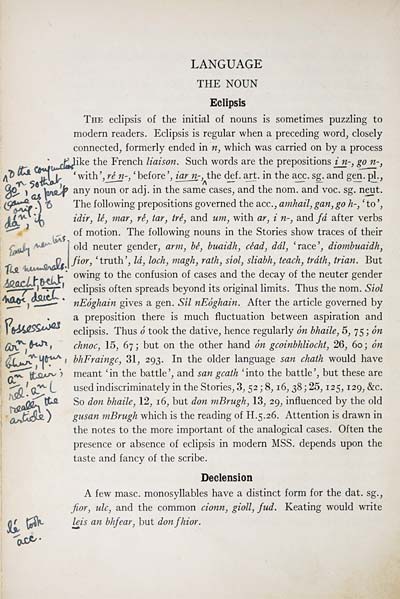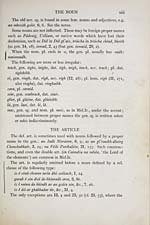Download files
Complete book:
Individual page:
Thumbnail gallery: Grid view | List view

LANGUAGE
THE NOUN
Eclipsis
The eclipsis of the initial of nouns is sometimes puzzling to
modern readers. Eclipsis is regular when a preceding word, closely
connected, formerly ended in n, which was carried on by a process
■ /JjLlike the French liaison. Such words are the prepositions i_n-, go n-,
/^7> i*** Jul u ' with %rén-, ' before ', iarjih, the def . art. in the a^. sg. and gen. gL,
^ ) WnflJf' 3.ny noun or adj. in the same cases, and the nom. and voc. sg. neut.
(5**J[^ N f) The following prepositions governed the ace, amhail, gan, go h-, ' to ',
kiy^ lU idir, U, mar, re, tar, tré, and um, with ar, i n-, and fa after verbs
-^ of motion. The following nouns in the Stories show traces of their
rA^ /v^/^ j old neuter gender, arm, be, buaidh, dad, ddl, 'race', diotnbuaidh,
n \fior, 'truth'. Id, loch, magh, rath, siol, sliabh, teach, trdth, trian. But
,1, , V- " owing to the confusion of cases and the decay of the neuter gender
^f -") "w"' eclipsis often spreads beyond its original limits. Thus the nom. Siol
^fi^^^aSiX^- . n£^g}iain gives a gen. Sil nEóghain. After the article governed by
^ . a preposition there is much fluctuation between aspiration and
1 ^44^55**^*" eclipsis. Thus ó took the dative, hence regularly on bhaile, 5, 75 ; on
Qj\^ fr<*^ I chnoc, 15, 67 ; but on the other hand on gcoinbhliocht, 26, 60 ; on
^LtJ^^K^ I bhFraingc, 31, 293. In the older language san chath would have
TZr'\t^siiLn^ "' meant ' in the battle ', and san gcath ' into the battle ', but these are
--7j ' qy^ (_ used indiscriminately in the Stories, 3, 52 ; 8, 16, 38 ; 25, 125, 129, &c.
'^^---^lltA So don bhaile, 12, 16, but don tuBrugh, 13, 29, influenced by the old
'/LrJ*^^ ^M5an 7H5rM^A which is the reading of H.5. 26. Attention is drawn in
the notes to the more important of the analogical cases. Often the
presence or absence of eclipsis in modern MSS. depends upon the
taste and fancy of the scribe.
Declension
A few masc. monosyllables have a distinct form for the dat. sg.,
Jior, ulc, and the common cionn, gioll, fud. Keating would write
lets an bhfear, but donjhior.
THE NOUN
Eclipsis
The eclipsis of the initial of nouns is sometimes puzzling to
modern readers. Eclipsis is regular when a preceding word, closely
connected, formerly ended in n, which was carried on by a process
■ /JjLlike the French liaison. Such words are the prepositions i_n-, go n-,
/^7> i*** Jul u ' with %rén-, ' before ', iarjih, the def . art. in the a^. sg. and gen. gL,
^ ) WnflJf' 3.ny noun or adj. in the same cases, and the nom. and voc. sg. neut.
(5**J[^ N f) The following prepositions governed the ace, amhail, gan, go h-, ' to ',
kiy^ lU idir, U, mar, re, tar, tré, and um, with ar, i n-, and fa after verbs
-^ of motion. The following nouns in the Stories show traces of their
rA^ /v^/^ j old neuter gender, arm, be, buaidh, dad, ddl, 'race', diotnbuaidh,
n \fior, 'truth'. Id, loch, magh, rath, siol, sliabh, teach, trdth, trian. But
,1, , V- " owing to the confusion of cases and the decay of the neuter gender
^f -") "w"' eclipsis often spreads beyond its original limits. Thus the nom. Siol
^fi^^^aSiX^- . n£^g}iain gives a gen. Sil nEóghain. After the article governed by
^ . a preposition there is much fluctuation between aspiration and
1 ^44^55**^*" eclipsis. Thus ó took the dative, hence regularly on bhaile, 5, 75 ; on
Qj\^ fr<*^ I chnoc, 15, 67 ; but on the other hand on gcoinbhliocht, 26, 60 ; on
^LtJ^^K^ I bhFraingc, 31, 293. In the older language san chath would have
TZr'\t^siiLn^ "' meant ' in the battle ', and san gcath ' into the battle ', but these are
--7j ' qy^ (_ used indiscriminately in the Stories, 3, 52 ; 8, 16, 38 ; 25, 125, 129, &c.
'^^---^lltA So don bhaile, 12, 16, but don tuBrugh, 13, 29, influenced by the old
'/LrJ*^^ ^M5an 7H5rM^A which is the reading of H.5. 26. Attention is drawn in
the notes to the more important of the analogical cases. Often the
presence or absence of eclipsis in modern MSS. depends upon the
taste and fancy of the scribe.
Declension
A few masc. monosyllables have a distinct form for the dat. sg.,
Jior, ulc, and the common cionn, gioll, fud. Keating would write
lets an bhfear, but donjhior.
Set display mode to: Large image | Transcription
Images and transcriptions on this page, including medium image downloads, may be used under the Creative Commons Attribution 4.0 International Licence unless otherwise stated. ![]()
| Early Gaelic Book Collections > Matheson Collection > Stories from Keating's History of Ireland > (18) |
|---|
| Permanent URL | https://digital.nls.uk/82065469 |
|---|
| Description | Items from a collection of 170 volumes relating to Gaelic matters. Mainly philological works in the Celtic and some non-Celtic languages. Some books extensively annotated by Angus Matheson, the first Professor of Celtic at Glasgow University. |
|---|
| Description | Selected items from five 'Special and Named Printed Collections'. Includes books in Gaelic and other Celtic languages, works about the Gaels, their languages, literature, culture and history. |
|---|

